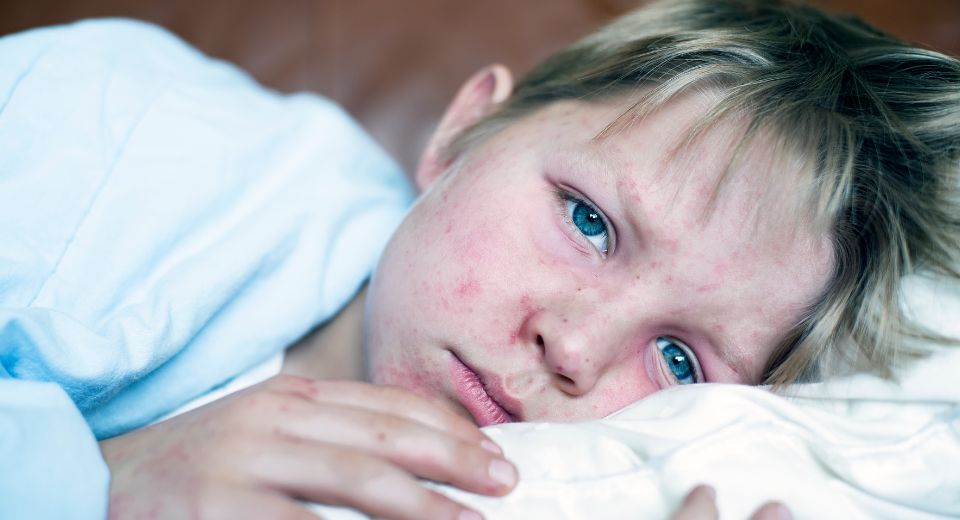Cases of measles is on the rise, with a global increase of 43% in measle-related deaths in 2022. Measles is wildly contagious. It can show symptoms can include a rash, high fever, cough, and runny nose . How worried should parents be if their baby is too young for the vaccine? Nearly 1 out of every 3 children under the age of 5 who catches measles ends up in the hospital. Are some babies at a greater risk? What, if anything, can parents do to protect their little ones? Read more about the signs, symptoms, and treatment options for children who show signs of measles.
Updates from the American Academy of Pediatrics
How soon can my baby get the measles vaccine?
The recommended age for the first dose of measles, mumps, and rubella (MMR) vaccine is 12 to 15 months of age. If you live in a community experiencing an outbreak, or if you travel internationally, your baby may be vaccinated as early as 6 months of age. Talk with your pediatrician if this applies to you.
Babies who get one dose of MMR vaccine before their first birthday should get two more doses (one dose at 12 through 15 months of age and another dose at least 28 days later).
My baby is too young for the vaccine. Is there anything I can do to protect her?
Wash your hands! Just as you would to prevent germs at any time, use soap and water and scrub for at least 20 seconds. Remind others in your home or anyone who is near your baby to do the same.
Other things that can help:
- Limit your baby’s exposure to crowds, other children, and anyone with colds.
- Go germ-free. Disinfect objects and surfaces in your home regularly.
- Feed your baby breastmilk. It has unique antibodies to prevent and fight infections.
Remember, the measles virus can live for two hours on a surface or suspended in the air.
Babies at a greater risk for catching measles include:
- Ones under 12 months who have not received the measles vaccine.
- Ones in a child care setting or living in crowded living conditions.
- Ones with older siblings.
- Ones who are not breastfed
If you are planning an international trip, consider your baby’s age.
- Babies less than 6 months old who are too young to be vaccinated may still have some protection from the antibodies from their mother. However, if you are traveling with an infant under 6 months of age to a place with a significant number of measles cases reported, it is worth considering delaying travel as measles can still be very severe in these young infants.
- Babies 6 to 11 months old should receive the MMR vaccine (and the hepatitis A vaccine), but still require two doses of vaccine at age 12 months or older.
- Babies 12 months and older should receive their first dose of MMR vaccine in addition to the other vaccines recommended at that age. Infants 12 months and older may also receive a second dose of the MMR vaccine as soon as 28 days after the first dose.
What are the Signs and Symptoms of Measles in Babies?
Infants and children can be contagious four days before they even show any symptoms!
Measles typically starts like a bad cold with symptoms such as fever, cough, runny nose, and conjunctivitis (pink eye). A measles rash then starts to develop on the head and spreads down to the rest of the body. Many children also get ear infections.
While the main symptoms of measles are bad enough, the reason we vaccinate against measles are to prevent the complications associated with it―such as pneumonia and encephalitis (an infection of the brain).
What is the outlook for a child who gets measles?
Not good. In the US, 1-2 out of every 1,000 children who get measles die from it. A similar number of children suffer from encephalitis and many go on to have long-term brain damage. The disease is even more severe in developing countries, where as many as 1 out of 3 children who get measles die from it.
Why don’t babies get the MMR shot sooner?
The MMR vaccine is a live vaccine, which means it contains weakened forms of the viruses. In order to work, those weakened forms of the virus need to multiply to create an immune response. Since the natural protection newborns get from their moms wears off gradually over a period of months, the viruses may not be able to multiply the way they would when the baby is a little older. That’s why we recommend the first dose of the MMR starting at 12 months of age. Not because it’s too dangerous but because that’s the age at which the vaccine works best.
What about pregnant moms?
Most women of child-bearing age have been vaccinated against measles, mumps, and rubella―and therefore are protected against these diseases.
If for some reason a pregnant woman was not previously vaccinated against measles, she cannot receive the MMR vaccine until after delivery. This is because the MMR vaccine is prepared with weakened live viruses (in contrast to many vaccines that are prepared with killed viruses), so doctors usually advise avoiding pregnancy for at least one month after receiving the vaccine to reduce the risk of becoming infected.
Do parents and grandparents need a booster MMR shot?
Anyone born before 1957 is generally considered immune to measles. This means they are fully protected from measles for life and no additional vaccination is necessary.
If you’re unsure whether you’re immune to measles, you should first try to find your vaccination records or documentation of measles immunity. If you do not have written documentation of measles immunity, you should get the MMR vaccine. There is no harm in getting another dose of MMR vaccine if you may already be immune to measles (or mumps or rubella).
If you or a loved one is showing signs or symptoms of the measles, please contact your pediatrician or come to your local urgent care immediately.
Author: Jyotsna Keni, MD, Pediatrician


